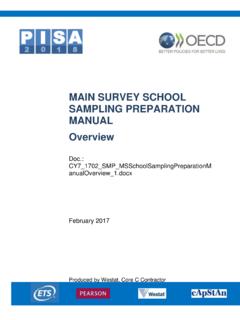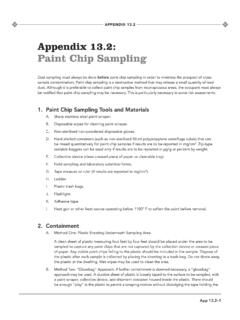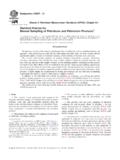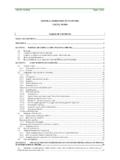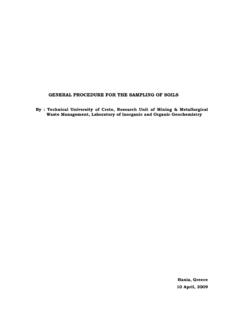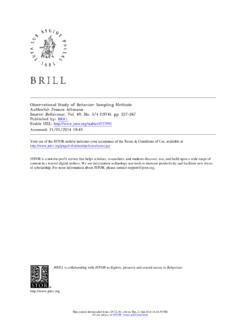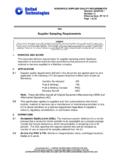Transcription of Thoughts on Auditor Training and Audit Sampling
1 Thoughts on Auditor Training and Audit Sampling Nate Manco, CQA, CQE, CMQ/OE,CPGP. ASQ/FDC North East Conference 10 Jan 2011. 1 10 Jan 2011. Auditor Skills . 1. Communication Both oral and written, a person who can be effective with a variety of audiences and at persuasion to secure needed action. 2. Experience Must be broad and encompass the product, manufacturing and support technologies. 3. Knowledge In basic disciplines of the business. Experience in quality technology and statistics are helpful 4. Investigation / Judgment Ability The ability to evaluate the significance of each item and identify trends and systematic problems distinguishes an Auditor from a reporter.
2 2 10 Jan 2011. Auditor Skills . 5. Peer Acceptance Very important. Without it, the Auditor credibility is lost and audits will not be effective. 6. Flexibility The ability to adjust rapidly to changing situations. Stable performance under pressure and adverse conditions will enhance the outcome. 7. Personal Traits Dedication, sincerity, enthusiasm, and a sense of humor. 3 10 Jan 2011. Auditor Competence Auditor Competence is achieved from a combination of: Education Work experience Auditor Training and experience Identify potential auditors and evaluate versus personal attributes, skills and knowledge criteria Then train and develop each Auditor accordingly 4 10 Jan 2011.
3 Auditor Training Three Needs o 1. Generic Auditing Skills - Industry independent - Includes company Audit Policy and Procedures - Auditing Tools and Techniques 2. Pharmaceutical GMP/Quality Standards 3. Pharmaceutical Technology 5 10 Jan 2011. Auditor Training Pre-evaluation Formal Initial Training Written/Oral Exam Experience Mentoring Certification Evaluation On-going Training , Self Study and Personal Development 6. 10 Jan 2011. Essentials of Effective Audits 1. Planning and Preparation 2. Consistent, Reliable Performance 3. Auditor Listening & Communication Abilities 4.
4 Auditor Constructive Persuasion Abilities 5. Brief, Accurate, Balanced Reports 6. Follow-up System 7. Management Support The first 6 are key areas for Auditor Training ! 7 10 Jan 2011. Essentials of Effective Audits 1. Planning and preparation Planning and preparation Planning and preparation - Audit Plan - Review Auditee History - Checklist development - Desk audits (Prereading). - Research Travel, Health & Safety, Cultural Issues 8 10 Jan 2011. Essentials of Effective Audits 2. Consistent, Reliable Performance Well-defined Audit objective Qualified people Using agreed-upon standards Able to distinguish the important few from the trivial many 3.
5 Auditor Interviewing, Listening and Communication Abilities Ask, Listen and Confirm understanding Communicate / discuss potential issues or concerns 9 10 Jan 2011. Essentials of Effective Audits 4. Constructive Persuasion Abilities Seek agreement on the facts Lead others to common conclusions Sets the stage for later root cause by the auditee Leads to more effective corrective and preventive actions 5. Brief, Accurate, Well-Balanced Reports Management summary (strengths and weaknesses). Findings (Conclusions) based on evidence (Observations). 10 10 Jan 2011. Essentials of Effective Audits 6.
6 Follow Up System Evaluate Auditee Responses Verify Corrective and Preventive actions completed and effective Keep management informed 7. Management Support 11 10 Jan 2011. 1 - 14 2004. Ethics & Professionalism Conduct Communications Independence Objectivity Conflict of Interest Sympathy Unethical Activities 12 10 Jan 2011. Communications Training Point Be aware of the message you are sending! We hear with our eyes as well as our ears We speak with our body as well as our mouth Facial expressions and body movements, however slight, are transmitted without awareness by the Auditor .
7 This type of communication is powerful that, regardless of the words spoken, a more insightful message is transmitted. 13 10 Jan 2011. Independence Training Point -True independence of the Audit function is reflected in the quality and objectivity of the Audit report. Independence helps maintain the objectivity, validity, and integrity of the Audit and the Audit report Auditors should Be free of restrictive influences from their own organization or management Avoid preconceived opinions 14 10 Jan 2011. Objectivity Audit results must be based on verifiable facts and the Audit requirements An objective Auditor gathers facts as they are presented or uncovered during the Audit Personal bias and prejudice must not be an influencing factor Training Point Avoid It's not the way 15.
8 My company does it, therefore 10 Jan 2011. Conflicts of Interest Auditors must be able to recognize and remove themselves from any Audit which constitutes real or potential conflict of interest (previous employer, personal relationship, financial interest, etc.). The appearance of a Conflict of Interest can be as damaging to credibility as the real thing. 16 10 Jan 2011. Sympathy and Empathy Empathy ( I ve been there I. understand ) facilitates open communication and is appropriate. Sympathy can compromise your objectivity feeling too sorry for the auditee may lead you to minimize the significance of Audit findings Reporting findings and observations in an impersonal and objective manner is the most beneficial action for everyone involved.
9 17 10 Jan 2011. Unethical Activities Disclosing Confidential Information Making derogatory remarks Bribery 18 10 Jan 2011. 3-13 2004. Auditing References The Quality Audit Handbook, 3rd ed. J. P. Russell, Editor ASQ Quality Press, 2005 (The official ASQ Audit bible). Management Audits: The Assessment of Quality Management Systems, 3rd ed. Alan J. Sayle. (Great reference for an Audit Group ). Quality Audits for Improved Performance, 2nd ed. Dennis R. Arter ASQ Quality Press. (Good, inexpensive intro to auditing). ANSI/ISO/ASQ QE 19011S-2004 Guidelines for quality and/or environmental systems auditing (Good section on Auditor competancies, evaluation and Training ).
10 19 10 Jan 2011. Other Audit Training Resources Certified Quality Auditor Body of Knowledge Auditor Training DVDs, Gorilla in the Midst-Auditing to Add Value , from Gestures The DO s and TABOOs of Body Language Around The World, Roger E. Axtell, Wiley 1998. 20 10 Jan 2011. GMP Training Often similar process as Auditor Training . although most candidate auditors already have core GMP Training Periodic and Ongoing Training new strategic business needs, new GMP/Quality Standards, Guidances, and FDA initiatives Audit specific topical Training On-going Self- Training and development 21 10 Jan 2011.
